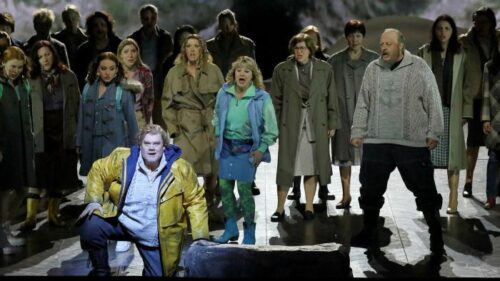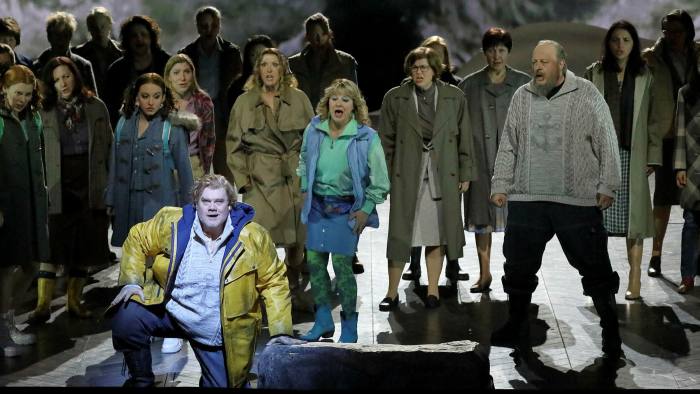 Germany Britten, Peter Grimes: Soloists, Children’s Chorus, Chorus and Orchestra of Bayerische Staatsoper / Edward Gardner (conductor). Nationaltheater, Munich, 6.3.2022. (ALL)
Germany Britten, Peter Grimes: Soloists, Children’s Chorus, Chorus and Orchestra of Bayerische Staatsoper / Edward Gardner (conductor). Nationaltheater, Munich, 6.3.2022. (ALL)

Production:
Director – Stefan Herheim
Set design – Silke Bauer
Costume design – Esther Bialas
Lighting – Michael Bauer
Video – Torge Møller
Dramaturgy – Malte Krasting, Alexander Meier-Dörzenbach
Chorus director – Stellario Fagone
Cast:
Peter Grimes – Stuart Skelton
Ellen Orford – Rachel Willis-Sørensen
Balstrode – Iain Paterson
Auntie – Claudia Mahnke
First Niece – Lindsay Ohse
Second Niece – Emily Pogorelc
Bob Boles – Thomas Ebenstein
Swallow – Brindley Sherratt
Mrs Sedley – Jennifer Johnston
Rev Horace Adams – Robert Murray
Ned Keene – Konstantin Krimmel
Hobson – Daniel Noyola
Covid restrictions in Munich have started easing. Audiences have to keep their masks on during performances but concert halls and opera houses are now filled to 75% capacity, a welcome step towards a tentative normality. And yet Covid took its toll on this production of Peter Grimes. The first two performances were cancelled. Both director Stefan Herheim and Michael Bauer (lighting) then fell ill. In the role of Bob Boles, Kevin Connors had to be replaced by Thomas Ebenstein, who has sung the part in Vienna.
There were many moments that left one wondering to what extent rehearsals had been affected by all these difficulties. Edward Gardner was making his house debut on this occasion. The orchestra was thrilling and very dramatic but often fairly loud. Incidentally, an article in the archives of Seen and Heard (click here) indicates that this may be typical of how Gardner conducts this work. More than once, there was a sense that the conductor was discovering in real time how powerful the Bayerische Staatsoper orchestra can be, as in rather more powerful than almost any orchestra in the UK. Similarly, the chorus was not always at ease in the first act. Choruses made up of native English speakers can relish individual words of this libretto, whereas this Bavarian chorus wielded power at the expense of clarity of diction. At this level of artistry, there is little doubt that many of these points will disappear with further performances, but yesterday I detected some of the usual flaws and challenges of premieres.

In the title role, Stuart Skelton was impressive. Here is a real Heldentenor capable of displaying a wide range of emotions and with the vocal ability to do justice to the role’s demands. The start of ‘Now the Great Bear and Pleiades’ showed how secure a singer he is. His last act monologue was chilling. By his side, Iain Paterson was a tormented but authoritative Balstrode. Rachel Willis-Sørensen, who was also making her house debut, was still not completely at ease in the Embroidery aria but the Prologue duet with Grimes, as well as the Act II women’s quartet, were superb.
Peter Grimes is a work that offers young singers many secondary characters in which they can shine. Among a strong cast, Mexican Daniel Noyola gave a strong Hobson, British Jennifer Johnston was a delightfully spiteful Mrs Sedley, her wig making her a Mrs Thatcher lookalike, and her compatriot Brindley Sherratt made much of his words in the role of Swallow.
Covid-stricken Stefan Herheim was also staging his first production here in Munich. The first part was a fairly traditional portrayal of the work with imaginative chorus movements. The setting was a ship-shaped theatre with video projections in the background. Herheim was more provocative in the second half, which articulated his concept of Grimes and the apprentice appearing as doppelgängers, dressed alike and portraying themselves as similar persons/victims. There were some brilliant passages, in particular the church scene, which had chorus and soloists moving around with a sense of freedom but allowing the singers to be close to the edge of the stage whenever they had solos to sing. However, there were also several cheap moments that did not add much. We could have done without the two nieces performing oral sex on a trouser-less Ned Keene while bickering with Mrs Sedley. Similarly, turning on the light in the hall as the chorus searches for Grimes adds little to what is already a mighty scene supported by very powerful music.
Peter Grimes is a moving and thrilling opera. It is also a very ambiguous text. This was an interesting ‘intellectual’ concept; it worked at times, but not always, thus robbing us of some of the work’s raw emotion.
So all in all, this new production was not quite at the same artistic level as previous new productions in Munich, e.g. of Shostakovich’s The Nose (review click here) or the recent Janáček’s The Cunning Little Vixen (review click here). But this was opening night and a number of things will no doubt settle during the future performances.
Since the beginning of the tragic war, the Bayerische Staatsoper has expressed solidarity with the Ukrainian people. The building was lit up in yellow and blue, just like the opera houses in Geneva and Zurich. Serge Dorny, the artistic director, made a short speech reminding us of Britten’s pacifist position during the War. The orchestra played the European anthem prior to the performance. The musical world is reacting with unity and on 8 March, members of Munich’s three orchestras, the Philharmonic, Bavarian Radio Symphony Orchestra and the Bayerisches Staatsorchester will play Beethoven under the baton of Lahav Shani with Anne-Sophie Mutter as soloist. This will be a benefit concert for Save the Children to help children in Ukraine and I encourage you to contribute.
Antoine Lévy-Leboyer
